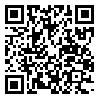Volume 34, Issue 3 (6-2024)
JHNM 2024, 34(3): 281-291 |
Back to browse issues page
Download citation:
BibTeX | RIS | EndNote | Medlars | ProCite | Reference Manager | RefWorks
Send citation to:



BibTeX | RIS | EndNote | Medlars | ProCite | Reference Manager | RefWorks
Send citation to:
Aflaki T, Olfati F, Mirzadeh M, Jourabchi Z. The Effect of Education Based on Health Belief Model on Self-Care Behaviors of Women with High Blood Pressure in Pregnancy. JHNM 2024; 34 (3) :281-291
URL: http://hnmj.gums.ac.ir/article-1-2377-en.html
URL: http://hnmj.gums.ac.ir/article-1-2377-en.html
1- Midwifery (MS), Student Research Committee, Qazvin University of Medical Science, Qazvin, Iran
2- Associate Professor, Department of Reproductive Health, Social Determinants of Health Research Center, Research Institute for Non-Communicable Diseases, Qazvin University of Medical Sciences, Qazvin, Iran
3- Assistant Professor, Department of Community Medicine, Metabolic Disease Research Center, Qazvin University of Medical Science, Qazvin, Iran
4- Associate Professor, Department of Community Health, Social Determinants of Health Research Center, Research Institute for Prevention of Non-Communicable Diseases, Qazvin University of Medical Science, Qazvin, ran ,zinat.jourabchi@ymail.com
2- Associate Professor, Department of Reproductive Health, Social Determinants of Health Research Center, Research Institute for Non-Communicable Diseases, Qazvin University of Medical Sciences, Qazvin, Iran
3- Assistant Professor, Department of Community Medicine, Metabolic Disease Research Center, Qazvin University of Medical Science, Qazvin, Iran
4- Associate Professor, Department of Community Health, Social Determinants of Health Research Center, Research Institute for Prevention of Non-Communicable Diseases, Qazvin University of Medical Science, Qazvin, ran ,
Abstract: (185 Views)
Introduction: Hypertension in pregnancy is one of the three main causes of maternal death after hemorrhage and sepsis. Education of hypertensive pregnant mothers can be effective in promoting self-care behaviors and ultimately proper control of blood pressure. The use of educational models can be very helpful in this regard compared to traditional methods.
Objective: This study aims to assess the effectiveness of education based on the health belief model (HBM) in improving the self-care behaviors of pregnant women with hypertension.
Materials and Methods: This is a quasi-experimental study with a pre-test/post-test design that was conducted on 90 women with hypertension in pregnancy who referred to one of the specialized women’s hospitals in Rasht, Iran, during January-August 2020. The participants were randomly divided into two groups of intervention and control using the random allocation software. The data collection tools included a demographic/obstetric form, a researcher-made HBM questionnaire, and a researcher-made hypertension in pregnancy self-care profile. The HBM-based education was provided to the intervention group at three sessions with an interval of one week. Data analysis was done using chi-square test, independent t-test, and ANCOVA. Cohen’s d (effect size) was also measured.
Results: The final data analysis was done on 39 women in the intervention group (mean age: 33.48±4.54 years) and 38 women in the control group (mean age: 32.73±5.93). The difference in the scores of knowledges and HBM constructs was not statistically significant between the two groups at baseline, but it was significant after education (P=0.001). The difference between the two groups was not statistically significant in self-care behaviors at baseline, except for diet/physical activity and disease/stress management (P=0.001). To control the effects of these two variables, ANCOVA was used. After intervention, the difference between the two groups in self-care behaviors was statistically significant (P=0.001).
Conclusion: The HBM-based education can make pregnant mothers more aware of hypertension and increase their self-care behaviors for proper control of blood pressure.
Objective: This study aims to assess the effectiveness of education based on the health belief model (HBM) in improving the self-care behaviors of pregnant women with hypertension.
Materials and Methods: This is a quasi-experimental study with a pre-test/post-test design that was conducted on 90 women with hypertension in pregnancy who referred to one of the specialized women’s hospitals in Rasht, Iran, during January-August 2020. The participants were randomly divided into two groups of intervention and control using the random allocation software. The data collection tools included a demographic/obstetric form, a researcher-made HBM questionnaire, and a researcher-made hypertension in pregnancy self-care profile. The HBM-based education was provided to the intervention group at three sessions with an interval of one week. Data analysis was done using chi-square test, independent t-test, and ANCOVA. Cohen’s d (effect size) was also measured.
Results: The final data analysis was done on 39 women in the intervention group (mean age: 33.48±4.54 years) and 38 women in the control group (mean age: 32.73±5.93). The difference in the scores of knowledges and HBM constructs was not statistically significant between the two groups at baseline, but it was significant after education (P=0.001). The difference between the two groups was not statistically significant in self-care behaviors at baseline, except for diet/physical activity and disease/stress management (P=0.001). To control the effects of these two variables, ANCOVA was used. After intervention, the difference between the two groups in self-care behaviors was statistically significant (P=0.001).
Conclusion: The HBM-based education can make pregnant mothers more aware of hypertension and increase their self-care behaviors for proper control of blood pressure.
Keywords: Health belief model (HBM), Self-care behaviors, Hypertension in pregnancy, Chronic hypertension
Article Type : Research |
Subject:
General
Received: 2024/06/12 | Accepted: 2024/06/21 | Published: 2024/07/1
Received: 2024/06/12 | Accepted: 2024/06/21 | Published: 2024/07/1
Send email to the article author
| Rights and permissions | |
 | This work is licensed under a Creative Commons Attribution-NonCommercial 4.0 International License. |




